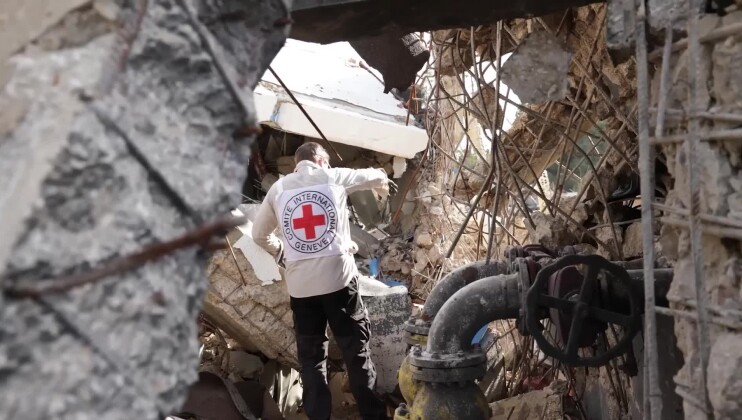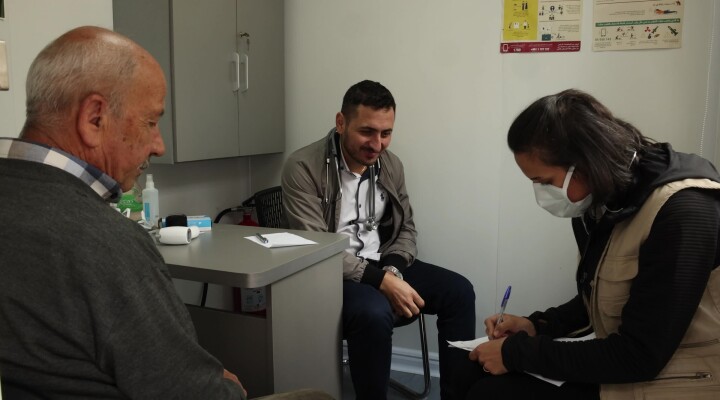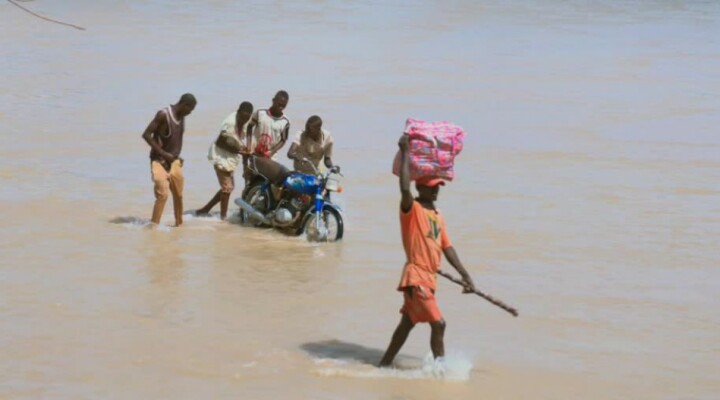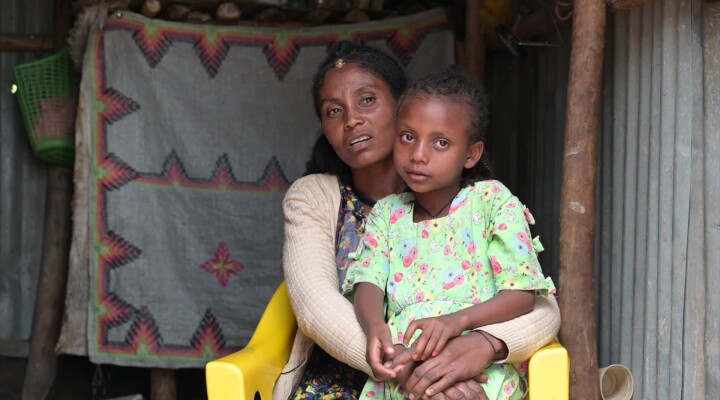Somalia: a hospital whiteboard tallies blast victims amid period of uncertainty
Eleven wounded patients were admitted to Mogadishu’s Madina Hospital on 25th September. A week earlier, five others were admitted. The admission numbers displayed on a whiteboard at the triage unit, show that weapon-wounded patients, casualties of explosions, car bombs, shoot-outs, grenade attacks and suicide bombs are a tragic part of life in the Somalia’s capital.
On 25th September, an explosive-laden vehicle detonated at the El-Gab junction in the heart of the city. Seven people died while 11 others were wounded and brought to the hospital. Salah Mohamed, a mechanic in the city, is one of them.
“There was smoke. I was confused and went into the fire but then turned away. I stepped out and the smoke hit my face. I escaped towards the Peace Garden,” the 29-year-old, whose face, arms and legs are covered in burns, recalled.
Amid the chaos after the bomb went off, his first instinct was to call his family.
“My older sister asked how I’m doing. ‘I’m injured,’ I responded. They started screaming and crying.”
Shrapnel from the blast tore through the left leg of Noordin Ali Isaac, 24. He considers himself lucky.
“I’m a father of two. My life and future all went dark. The service I received from Madina hospital was good and I’m recovering. I cannot complain considering the small injury I have,” said Ali.
Civilians like Salah and Noordin continue to bear the brunt of the decades-long conflict in Somalia. According to Armed Conflict Location and Event Data Project (ACLED), 465 civilians died last year as a result of the conflict. As of September, 296 fatalities have been recorded this year.
“Our message is always the same. Spare civilians from violence and conflict. Protect women and children. And respect the very basic rules of the international humanitarian law,” said ICRC Director of Operations Dominik Stillhart during his visit to the Somali Red Crescent ambulance response unit in Mogadishu.
When the five patients noted on the whiteboard were admitted, it was after a suicide bomber walked into a tea shop. Last month, more than 60 patients were admitted with weapon wounds -- 30% of the hospital’s total admissions.
Madina is Somalia’s de facto war hospital and over the years its admission numbers have become a barometer for the level of insecurity in Somalia’s capital. In a year marked with simmering tensions due to the ongoing polls and Somalia’s fractious government, the hospital’s whiteboard of numbers serves as a bulletin board of emergencies.
“If something happens in Mogadishu, four out of the five injured visit the hospital. There’s a possibility the patients visit other facilities but 90% come to this hospital. So, if you arrived today, and haven’t gone out to the city, what will inform you of the security situation is the patients we receive and where they are coming from,” said Dr. Abdikadir Haji Maalim, a surgeon at the hospital.
Madina Hospital is one of four hospitals that the International Committee of the Red Cross (ICRC) supports in Somalia. Keysaney Hospital, also in the capital, Bay Regional Hospital in Baidoa and Kismayo General Hospital in the southern region of Lower Juba are the other three. Combined, they have treated 231 weapon-wounded patients as of June this year. More than half of these cases were attended to in Madina.
Surgical care is an essential part of the treatment regimen for trauma patients, and Madina hospital boasts the capacity to conduct four simultaneous surgeries, the highest in the country. However, that capacity has been tested in the past. In 2017, nearly 600 people were killed and hundreds were wounded when a truck filled with explosives was detonated at one of the busiest intersections in the city. Madina hospital was stretched way beyond its limits.
“October 14 was a sad day. We can say it was the most difficult day and we couldn’t cope with the number of patients. There were that many patients. About 50 to 80 patients received stomach surgeries. Those that received vascular surgeries. The number of amputations. It was a tough day. It wasn’t only a single day. We had to attend to the very serious patients first and delay the rest to the next day. It took us three to four days to get to all patients,” recalls Dr. Abdikadir.
The ICRC supports the surgery wards in all four hospitals by providing equipment, training and medical expertise. Running costs such as salaries, medical supplies, maintenance work and electricity are also covered by the organization.
For further information, please contact:
Abdikarim Mohamed, Nairobi, +254 770 171 756, mabdikarim@icrc.org
Alyona Synenko, Nairobi, +254 716 987 265, asynenko@icrc.org
SHOTLIST
Location: Mogadishu, Somalia
Length: 11’ 26’’
Camera: Abdikarim Mohamed
Editor: Abdikarim Mohamed
Filming Date: 29 September 2021, 4 October 2021
Copyright: ICRC access all
On Screen Credit: ICRC or logo
00:00:00 - 00:00:17 Entrance of Madina Hospital from across the street.
00:00:17 - 00:00:28 People walking out of Madina Hospital.
00:00:28 - 00:00:35 Sign board of Madina Hospital.
00:00:35 - 00:00:50 Somalia flag waving in the wind.
00:00:50 - 00:01:00 The entrance of the hospital's admission and triage unit.
00:01:00 - 00:01:07 Whiteboard in Madina hospital with monthly statistics inside the admissions and triage unit.
00:01:07 - 00:01:14 Close-up of the whiteboard showing weapon wounded.
00:01:14 - 00:01:19 Salah Mohamed in Madina hospital.
00:01:19 - 00:01:35 Nurse tucks in mosquito net under Salah's bed.
Quote - Salah
00:01:35 - 00:01:39 “When I reached at the checkpoint where cars are
inspected,
00:01:39 - 00:01:42 and crossed over the barricade before getting to the MCH.
00:01:42 - 00:01:45 There was some distance between me and the MCH gate.
00:01:45 - 00:01:48 The car exploded before I got there.
00:01:48 - 00:01:53 There was smoke.
00:01:53 - 00:01:58 I was confused and went into the fire but then turned away.
00:01:58 - 00:02:01 I stepped out and the smoke hit my face.
00:02:02 - 00:02:04 I escaped towards the Peace Garden.
00:02:05 - 00:02:07 I ran into many problems.
00:02:07 - 00:02:09 I even ran into some thieves.
00:02:09 - 00:02:12 That's the problem I faced.”
00:02:12 - 00:02:28 Nurse checks Salah's file.
00:02:28 - 00:02:37 Burns on Salah's hands and legs.
Quote - Salah
00:02:38 - 00:02:43 “When your mother and father see you in this condition
00:02:43 - 00:02:47 you know how they can be.
00:02:47 - 00:02:53 I called my mother, her line was busy. Then they called me back.
00:02:53 - 00:02:56 ‘Hey Salah, how are you?’ they said.
00:02:56 - 00:03:00 Because they knew I liked walking around.
00:03:01 - 00:03:04 My older sister asked about how I’m doing.
00:03:04 - 00:03:06 ‘I'm injured’ I said.
00:03:07 - 00:03:09 They started screaming and crying.
00:03:10 - 00:03:14 My mum froze and then came down without her head scarf.
00:03:14 - 00:03:19 The area was closed off, no one was coming in or out.”
00:03:19 - 00:03:30 Noordin's bandaged leg.
Quote - Noordin
00:03:30 - 00:03:39 “Considering the magnitude of the explosion and the small injury I sustained, it’s nothing.
00:03:39 - 00:03:42 I’m a father of two.
00:03:43 - 00:03:49 My life and future all went to the dark.
00:03:49 - 00:03:54 The service I received from Madina hospital was good and I'm recovering.
00:03:55 - 00:03:57 I cannot complain considering the small injury I have.”
00:03:58 - 00:04:15 Noordin displays his X-ray scan.
Quote - Noordin
00:04:15 - 00:04:18 “I was like, what brought you here?
00:04:19 - 00:04:25 Why are you in this country with all the killings and difficulties?
00:04:25 - 00:04:27 Why are you still here, why didn't you leave earlier?
00:04:27 - 00:04:31 After an incident, one is in shock.
00:04:31 - 00:04:41 You look and see you were 30 yards away from it.
00:04:41 - 00:04:46 You see the dead and wounded and you worry a lot.
00:04:46 - 00:04:53 Until midday the next day, I was still shaken but I'm better now.”
Quote – Dominik Stillhart
00:04:53 - 00:04:55 “Well, our message is always the same.
00:04:56 - 00:05:01 Spare the civilians from violence and conflict.
00:05:01 - 00:05:03 Protect the women and children.
00:05:03 - 00:05:08 And respect the very basic rules of international humanitarian law
00:05:08 - 00:05:12 that are also deeply dragged in the Somali culture.
00:05:12 - 00:05:13 As I understand well.
00:05:13 - 00:05:18 So, I think, that is really the most important message for us.”
00:05:18 - 00:05:27 Operational theatre in Madina hospital. Surgeon cleans the wounded leg of a patient.
00:05:27 - 00:05:44 Surgeons in the OT attending to a patient.
00:05:44 - 00:05:51 Weapon-wounded patient with injury on the right knee on operating table.
00:05:51 - 00:06:00 Patient wound is sterilized in the operating theatre.
00:06:00 - 00:06:14 Surgeons at Madina hospital operating on a patient.
00:06:14 - 00:06:28 Surgeons operating on a weapon-wounded patient.
00:06:28 - 00:06:38 Patient wound is covered.
Quote – Dr. Abdikadir
00:06:38 - 00:06:41 “It's true, the hospital is a reflection.
00:06:41 - 00:06:43 If something happens in Mogadishu,
00:06:43 - 00:06:47 four out of the five injured visit the hospital.
00:06:47 - 00:06:49 There’s a possibility the patient visit other facilities,
00:06:49 - 00:06:52 but 90% come to this hospital.
00:06:52 - 00:06:56 So if you arrived today, and you haven't gone out to the city
00:06:56 - 00:07:00 what will inform you of the security situation is the patients we receive
00:07:01 - 00:07:02 and where they are coming from.
00:07:02 - 00:07:04 You will tell if a patient has bullet wounds
00:07:04 - 00:07:06 Was there a shootout between two groups?
00:07:06 - 00:07:08 Have explosions increased in the city?
00:07:08 - 00:07:09 You will be able to tell.
00:07:09 - 00:07:11 Not only Mogadishu town,
00:07:11 - 00:07:12 even where there is an incident in the other regions,
00:07:12 - 00:07:14 It has a huge impact on us.
00:07:14 - 00:07:17 Because if a patient sustains injuries in Beled Hawo
00:07:17 - 00:07:19 most likely he will come to us the following day.”
00:07:19 - 00:07:38 OT monitor showing vitals of patient in surgery.
00:07:38 - 00:07:48 Close-up of monitor showing patient vitals.
00:07:48 - 00:08:10 Oxygen concentrator in the OT.
00:08:10 - 00:08:20 Close-up of oxygen concentrator machine in the OT.
00:08:20 - 00:08:30 Used surgical instruments.
00:08:30 - 00:08:38 Intravenous drip.
00:08:38 - 00:08:46 Close-up of drip.
Quote: Dominik Stillhart
00:08:46 - 00:08:50 “There is really a very strong feeling of insecurity.
00:08:51 - 00:08:54 People don't know what is happening the next day.
00:08:55 - 00:09:01 Apparently it is extremely difficult to understand who is who?
00:09:02 - 00:09:03 And who is doing what?
00:09:03 - 00:09:10 So, there's a general sense of insecurity that is
weighing very heavily on the people here living in Mogadishu.”
Quote: Dr. Abdikadir
00:09:10 - 00:09:13 “Madina hospital is always on alert.
00:09:14 - 00:09:15 We are always on alert.
00:09:15 - 00:09:19 Whether there is a crisis or not, because things can happen any time.
00:09:20 - 00:09:24 You go home for lunch and you hear an explosion just happened at Zobe, in Banadir.
00:09:24 - 00:09:32 So every doctor is on standby to be called in when things happen.
00:09:32 - 00:09:34 So we have the contacts of every doctor.
00:09:34 - 00:09:37 By the time an incident happens, they are called.
00:09:37 - 00:09:40 Also when tensions are high like it is now,
00:09:40 - 00:09:46 The doctors are attentive and are ready to be called anytime.”
00:09:46 - 00:09:57 Mogadishu traffic along Zobe junction where 14 October 2017 blast took place.
Quote: Dr. Abdikadir
00:09:57 - 00:10:02 October 14 was a sad day.
00:10:02 - 00:10:09 We can say it was the most difficult day and we couldn't cope with the number of patients.
00:10:09 - 00:10:10 There were that many patients.
00:10:10 - 00:10:14 About 50 to 80 patients received stomach surgeries.
00:10:14 - 00:10:16 Those received vascular surgeries.
00:10:16 - 0:10:18 The number of amputations
00:10:18 - 00:10:20 It was tough day.
00:10:20 - 00:10:22 It wasn’t only a single day.
00:10:22 - 00:10:29 We attended to the very serious patients first and delay the rest to the next day.
00:10:29 - 00:10:33 It took us 3 to 4 days to get to all the patients.
00:10:33 - 00:10:39 Patients with minor injuries for example were attended to the next day.
00:10:39 - 00:10:44 It was a really painful day that’s unforgettable to us.
00:10:44 - 00:10:48 All Somalis witnessed that day.
00:10:48 - 00:10:53 Sign at the entrance of Madina hospital's pharmacy.
00:10:54 - 00:11:12 Long shot, staff in pharmacy.
00:11:12 - 00:11:26 Pharmacy staff remove medicine from the shelves.



